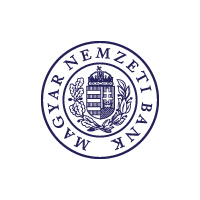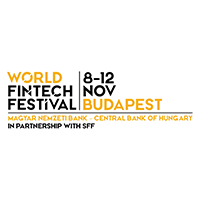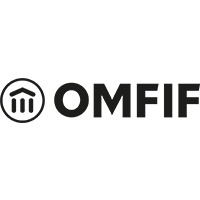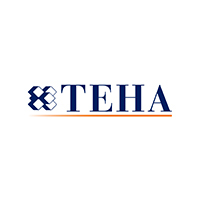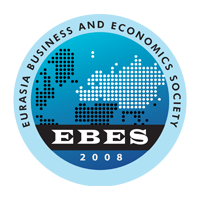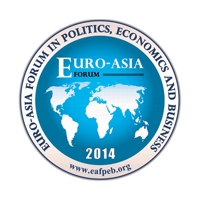2021
nyomtatásE-CONFERENCE 2021
The Budapest Eurasia Forum 2021 E-Conference was the second event of the Budapest Eurasia Forum conference series, which began its journey in 2020. After the successful E-Conference 2020, the Forum returned again in the virtual space, under the title “Sustainable Recovery and Prosperity in Eurasia – Trends, Future, Solutions” with a fully-fledged agenda of a high-level opening ceremony and six thematic panels. The concept of the event reflected the MNB’s efforts towards contributing to the international dialogue and strengthening professional cooperation among various members of the global community.
Located in the heart of Europe, Hungary is well-positioned to serve as an intellectual hub for experts from different countries and support cooperation between Europe and Asia. In line with this, the E-Conference 2021 continued to bring together high-ranking decision-makers, entrepreneurs, business leaders and academics to e-meet in Budapest and share their ideas on the best models of sustainable and digital development. As previously, our speakers represented Europe, China, Singapore, the Republic of Korea, Kazakhstan and other emerging economies – a unique variety of professionals in one of the most important hubs of Central and Eastern Europe.
The Budapest Eurasia Forum 2021 had a considerable impact again and it attracted around 15 thousand of people in the audience, which was a great success after 2000 viewers in 2020. This result was clearly reflected in the 2021 agenda as that year, the MNB was also launching a volume of studies – a collection of papers by our esteemed partners, putting the “Eurasia” concept into work in the scientific dialogue as well.
Sustainable Recovery and Prosperity in Eurasia – Trends, Future, Solutions
18-19 November 2021
The aftermovie of the Budapest Eurasia Forum 2021 E-Conference
Report on the Budapest Eurasia Forum 2021 E-Conference
What is the secret of the Asian technological successes of recent years? How can the West and the East learn from each other in the fields of innovation and investment promotion policies? What role do central banks play in the digital and green transition of the financial system? How does digitalisation affect the education sector? What are the major challenges to growth in the world economy? What future does Eurasian cooperation face in the century of a transforming world order? Last year’s Budapest Eurasia Forum, a conference held annually by the Magyar Nemzeti Bank (the central bank of Hungary, MNB) since 2019, sought answers to these and similar questions. The event was organised as an e-conference on 18 and 19 November 2021, attracting more than 15,000 viewers.
PROGRAMME
Thursday, 18 November 2021.
09:30-10:10
High-level opening ceremony
Welcome speech
- György H Matolcsy, Governor, Magyar Nemzeti Bank (MNB)
Guest speakers
- Zhenmin LIU, Under-Secretary-General for Economic and Social Affairs, United Nations
- Péter SZIJJÁRTÓ, Minister, Ministry of Foreign Affairs and Trade, Hungary
- Guoli TIAN, Chairman and Executive Director, China Construction Bank
PANEL 1. FINANCE: The Role of Central Banks in the Wake of the Pandemic – Experiences Across Eurasia
PANEL 1. FINANCE: The Role of Central Banks in the Wake of the Pandemic – Experiences Across Eurasia
The panel aims to discuss the effects and experiences of crisis management and supporting post-COVID recovery tools by central banks. Speakers will focus on the new roles of central banks and lessons learnt from the pandemic as well, taking into consideration challenges such as large-scale adverse effects of climate change, new pandemics, among others.
10:10-10:30
Keynote speech
- Gang YI, Governor, People’s Bank of China
10:30-11:25
Panel discussion
- David MARSH, Chairman, OMFIF
- Sopnendu MOHANTY, Chief Fintech Officer, Monetary Authority of Singapore
- Alexander MOROZOV, Director, Research and Forecasting Department, Bank of Russia
- Yang Su PARK, Director General, Economic Research Institute, Bank of Korea
Moderator:
- Barnabás VIRÁG, Deputy Governor, MNB
11:25-11:35
Coffee break
PANEL 2. GEOPOLITICS: The New Era of Geopolitics in Eurasia
PANEL 2. GEOPOLITICS: The New Era of Geopolitics in Eurasia
The changing landscape of world politics create new challenges and opportunities for the nations across Eurasia. The panel speakers will examine the prospective for the Eurasian cooperation in the next decades and position of the Eurasian countries in the world after 2021.
11:35-11:55
Fireside chat
- Parag KHANNA, Bestseller Author, Expert of International Relations, Geopolitics
Moderator:
- Norbert CSIZMADIA, President of the Board of Trustees, PADME
11:55-12:50
Panel discussion
- Rana MITTER, Professor of the History and Politics of Modern China, Director of the University of Oxford China Centre, University of Oxford China Centre
- Roza NURGOZHAYEVA, Former Vice President-General Counsel and Professor of Law, Nazarbayev University
- Huiyao WANG, Founder and President, Center for China and Globalization (CCG)
Moderator:
- Elena ROVENSKAYA, Program Director, IIASA
12:50-13:20
Coffee break
PANEL 3. INFRASTRUCTURE, CONNECTIVITY AND TECHNOLOGY: Innovation is the New Normal
PANEL 3. INFRASTRUCTURE, CONNECTIVITY AND TECHNOLOGY: Innovation is the New Normal
Nowadays, due to the pandemic there is an increased demand for digital innovations that support the economy as a whole and everyday life as well. The panel is exploring how does digital infrastructure increase social and economic resilience and how did the tech industry react to the pandemic. It will discuss the development of AI, drone technology, robotics applications and big data tools.
13:20-13:40
Fireside chat
- Christopher MATTHEISEN, General Manager, Microsoft Hungary
13:40-14:35
Panel discussion
- Justyna CZYSZEK, Vice Director of the Investor Support Department, Kraków Technology Park Special Economic Zone, Poland
- Glenn DIESEN, Professor, University of South-Eastern Norway
- Radosław KEDZIA, Vice president of Huawei CEE & Nordic region
- Sixuan LI, Founder of ViaVia Shopping & Financial Commentator at CCTV Business
Moderator:
- Péter FÁYKISS, Director, MNB
Friday, 19 November 2021.
PANEL 4. ECONOMY: Innovation and Investments in Eurasia: Recent Best Practices
PANEL 4. ECONOMY: Innovation and Investments in Eurasia: Recent Best Practices
Success stories of emerging tech companies are drawing more and more attention to the unique ecosystem of innovation in Asia. What is so special about innovation zones and networks in China and elsewhere?
09:00-09:20
Keynote speech
- Qiang NI, Vice Governor, Hainan Provincial People’s Government
09:20-10:15
Panel discussion
- Paolo BORZATTA, Member of the Board, The European House – Ambrosetti
- Zongxian FENG, Professor and Chief Expert of BRI, Xi’an Jiaotong University, Member, Shaanxi Provincial Government Advisory Committee
- Mateusz RYKAŁA, Vice President of the Management Board, Katowice Special Economic Zone
- David ZENG, Director of Corporate Affairs, Merck Holding (China) Ltd.
Moderator:
- Dániel PALOTAI, Executive Director, IMF
10:15-10:25
Coffee break
PANEL 5. MULTILATERAL COOPERATION: Green Cooperation and Green Multilateralism – sustainable ways to handle global threats
PANEL 5. MULTILATERAL COOPERATION: Green Cooperation and Green Multilateralism – sustainable ways to handle global threats
The year of 2020 was a great example to make it more obvious that sustainability and green growth are the only ways to handle global threats. Regional and global development banks, multilateral institutions and cross-border initiatives like Green Silk Road have a leading role in promoting green transformation and enhance importance of green cooperation on regional and global level. These institutions and strategies do not only strengthen cooperation among their members during the recovery from pandemic, but they should also address regional and global partnership in more green projects for our long-term sustainable future.
10:25-10:45
Fireside chat
- Simon TAY, Chairman, Singapore Institute of International Affairs
Moderator:
- Csaba KANDRÁCS, Deputy Governor, MNB
10:45-11:40
Panel discussion
- Lin CHENG, Director of Center for International Collaborations of the Beijing Institute of Finance and Sustainability
- Asel NURAKHMETOVA, Advisor, AIFC Green Finance Centre
- Wenhong XIE, Head of China, Climate Bonds Initiative
- Linda ZEILINA, Founder and CEO, International Sustainable Finance Centre
Moderator:
- Tamás BARANYI, Deputy Director, Institute for Foreign Affairs and Trade
11:40-11:50
Coffee break
PANEL 6. EDUCATION: New Skills for a Digital Age – The Increasing Role of Digital Literacy
PANEL 6. EDUCATION: New Skills for a Digital Age – The Increasing Role of Digital Literacy
The rapid digitalisation, effecting all spheres of our lives requires a different skillset as well. Identifying these skills is a major task ahead of educational policymakers and institutions. The panel discusses the ongoing digital transformation from the educational perspective and highlights the main responsibilities of universities in providing the adequate skillset for a digital age.
11:50-12:10
Fireside chat
- Zhimin CHEN, Vice President, Fudan University
Moderator:
- Levente HORVÁTH, Director of Eurasia Center, John von Neumann University, Former Chief Advisor to the Governor, MNB
12:10-13:05
Panel discussion
- Paul CHEUNG, Director, Asia Competitiveness Institute, Professor, Lee Kuan Yew School of Public Policy, National University of Singapore
- Sang-Hyun JANG, Director, Korea Education and Research Information Service (KERIS)
- Sandra KUČINA SOFTIĆ, President, European Distance and E-Learning Network (EDEN)
- Timothy O’CONNOR, Director of the Center of Competency, National University of Science and Technology MISIS (NUST MISIS)
Moderator:
- Kristóf LEHMANN, Director, MNB
13:05-13:10
Closing remarks
- Mihály PATAI, Deputy Governor, MNB
Speakers
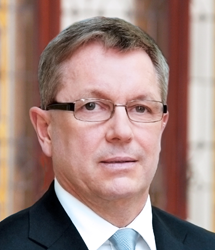
György H Matolcsy
Governor
Magyar Nemzeti Bank
György H Matolcsy
Governor
Magyar Nemzeti Bank
Dr. György Matolcsy serves his second term as the governor of Magyar Nemzeti Bank, the central bank of Hungary. He was nominated to the position in 2013 and his tenure was renewed in 2019 for another 6 years. Since 2013 he is also a member of the Fiscal Council. Prior to his current position he was minister of national economy between 2010-2013. In 2007 he founded the Hungarian Economic Development Institute, which he headed for 3 years. Between 2000-2002 he was Hungary’s minister of economic affairs. Mr Matolcsy is the author of the Széchenyi Plan, a comprehensive strategy aiming to promote the economic growth in Hungary.
He was director of the Institute for Growth (2002-2010) and its predecessor organisation, the Privatisation Research Institute from 1995 to 2000. From the end of 1998 he has been a member of the economic advisory body of Prime Minister Viktor Orbán.
Starting in 1991 he spent 3 years as a member of the Board of Governors at the European Bank for Reconstruction and Development (EBRD) representing the Hungarian Government. In 1990 he joined the Office of the Prime Minister and served as the personal economic advisor to Prime Minister József Antall.
Acknowledging his efforts in promoting economic development in Hungary, he was awarded the Barankovics Commemorative Coin in 2013.
He graduated at Karl Marx University of Economics in 1977 and obtained his Doctorate degree in 1984.
Mr. Matolcsy is actively involved in educational activities. He is a frequent lecturer at top foreign and Hungarian universities. He is an honorary doctor at the University of Debrecen and the University of Kaposvár, and honorary member of Fudan Development Institute (FDDI) of Fudan University and of the FDDI International Advisory Board of Shanghai Forum.
Mr Matolcsy is the author of numerous publications, articles and books. His most recent book, Economic Balance and Growth was published in 2015, whereas his other books include Bringing Up the Rear (Éllovasból sereghajtó; 2008), American Empire (Amerikai birodalom; 2004), and Our Living Memories (Élő emlékeink; 2003).

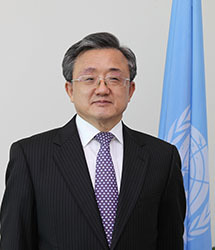
Zhenmin Liu
Under-Secretary-General for Economic and Social Affairs
United Nations
Zhenmin Liu
Under-Secretary-General for Economic and Social Affairs
United Nations
United Nations Secretary-General António Guterres has appointed Mr. LIU Zhenmin of China as the Under-Secretary-General for Economic and Social Affairs effective 26 July 2017. Prior to his appointment, Mr. LIU was Vice-Minister for Foreign Affairs of China. Among his various diplomatic assignments, he served as Ambassador and Permanent Representative, Permanent Mission of the People’s Republic of China to the United Nations Office at Geneva and Other International Organizations in Switzerland (2011-2013).
Mr. LIU brings to the position more than 30 years of experience in the diplomatic service, with a strong focus on the promotion of bilateral, regional and global issues. He was deeply involved for 10 years in climate change negotiations including the conclusion of the Kyoto Protocol and the Paris Agreement. He also widely participated in the international activities on the protection of our planet including Antarctica and the oceans. Over the last several years, in various capacities, he has been consistently highlighting and advocating for sustainable development issues.
As Under-Secretary-General for Economic and Social Affairs, Mr. LIU guides UN Secretariat support for the follow-up processes of the 2030 Agenda for Sustainable Development, including the High-level Political Forum on Sustainable Development. He also oversees the substantive services to many intergovernmental processes, including the annual meetings of the Second and Third Committees of the General Assembly, the meetings of the Economic and Social Council, including its Development Cooperation Forum, and the work of the subsidiary bodies of ECOSOC.
Mr. LIU holds a Master of Laws from the Law School of Peking University. He was born in August 1955 in Shanxi Province, China. Mr. LIU is married.

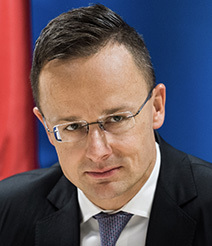
Péter Szijjártó
Minister
Ministry of Foreign Affairs and Trade, Hungary
Péter Szijjártó
Minister
Ministry of Foreign Affairs and Trade, Hungary
· born on 30th October 1978 in Komárom
· conferred his degree in the faculty of Foreign Affairs at the University of Economic Sciences and Public Administration in 2002 in Budapest
· has been Member of Parliament for Fidesz since 2002 having started between 2012 and 2014
· Appointed Deputy Minister of Foreign Affairs and Trade in June, 2014
· Assigned Minister of Foreign Affairs and Trade of Hungary since 23th September 2014
· is a practising Roman Catholic
· married and the father of two sons
· formerly registered futsal player, having played two games in 1st division and eighty-five in 2nd between 2011 and 2016 his fifth term in 2018
· Communications Director of Fidesz between 2006 and 2010
· Prime Minister’s Spokesperson between 2010 and 2012
· State Secretary for Foreign Affairs and External Economic Relations

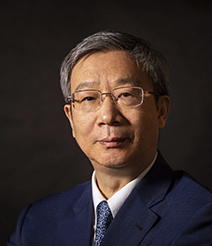
Gang Yi
Governor
People’s Bank of China
Gang YI
Governor
People’s Bank of China
Dr. YI Gang is the Governor of the People’s Bank of China and the Deputy Director of the Financial Stability and Development Committee of the State Council. He sits on the Board of Directors of the Bank for International Settlements.
Dr. Yi joined the People’s Bank of China in 1997 and has held a number of positions, including Secretary-General of the Monetary Policy Committee and Director-General of the Monetary Policy Department. In December 2007, he became a deputy governor and was appointed Administrator of the State Administration of Foreign Exchange in July 2009, a position he held until December 2015. He was appointed Governor of the People’s Bank of China in March 2018.
Dr. Yi received a Ph.D. in Economics from the University of Illinois in 1986 and was a faculty member in the Department of Economics, Indiana University from 1986 to 1994. In 1994, he co-founded the China Center for Economic Research (CCER) at Peking University and has been a professor at the CCER since then.
His research interests include money, banking and the Chinese economy.

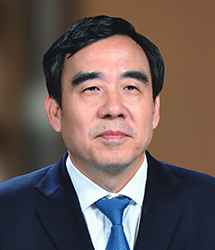
Guoli Tian
Chairman and Executive Director
China Construction Bank
Guoli Tian
Chairman and Executive Director
China Construction Bank
Mr. Tian Guoli has served as Chairman and Executive Director of China Construction Bank Corporation (CCB) since October 2017, and concurrently as Chairman of Sino-German Bausparkasse since March 2018. Mr. Tian currently also serves as Chairman of China Banking Association, a member of the Expert Committee for the 14th Five-Year Plan for Economic and Social Development of China, a member of the Monetary Policy Committee of the People’s Bank of China and a member of International Advisory Panel of Monetary Authority of Singapore. Mr. Tian joined Bank of China Limited in April 2013 and served as Chairman of Bank of China Limited from May 2013 to August 2017. During this period, he also served as Chairman and Non-executive Director of Bank of China Hong Kong (Holdings) Limited. From December 2010 to April 2013, Mr. Tian served as Vice Chairman and General Manager of China CITIC Group Corporation. During this period, he also served as Chairman and Non-executive Director of China CITIC Bank Corporation Limited. From April 1999 to December 2010, Mr. Tian served consecutively as Vice President and President of China Cinda Asset Management Company, and Chairman of China Cinda Asset Management Co., Ltd. From July 1983 to April 1999, Mr. Tian held various positions in CCB, including sub-branch manager, branch deputy general manager, general manager of Head Office departments, and Assistant President of CCB. Mr. Tian is a senior economist. He received a bachelor’s degree in economics from Hubei Institute of Finance and Economics in 1983.

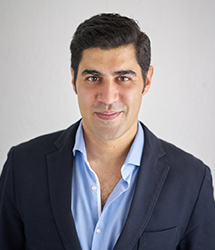
Parag Khanna
Bestseller Author
Expert of International Relations, Geopolitics
Parag Khanna
Bestseller Author
Expert of International Relations, Geopolitics
Parag Khanna is a leading global strategy advisor, world traveler, and best-selling author. He is Founder & Managing Partner of FutureMap, a data and scenario based strategic advisory firm. Parag's newest book is MOVE: The Forces Uprooting Us (2021), which was preceded by The Future is Asian: Commerce, Conflict & Culture in the 21st Century (2019). He is author of a trilogy of books on the future of world order beginning with The Second World: Empires and Influence in the New Global Order (2008), followed by How to Run the World: Charting a Course to the Next Renaissance (2011), and concluding with Connectography: Mapping the Future of Global Civilization (2016). He is also the author of Technocracy in America: Rise of the Info-State (2017) and co-author of Hybrid Reality: Thriving in the Emerging Human-Technology Civilization (2012). Parag was named one of Esquire’s “75 Most Influential People of the 21st Century,” and featured in WIRED magazine’s “Smart List.” He holds a Ph.D. from the London School of Economics, and Bachelors and Masters degrees from the School of Foreign Service at Georgetown University. He has traveled to nearly 150 countries and is a Young Global Leader of the World Economic Forum.

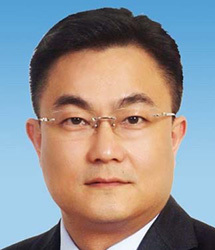
Qiang NI
Vice Governor
Hainan Provincial People’s Government
Qiang NI
Vice Governor
Hainan Provincial People’s Government
Mr. Ni Qiang started his career in January 1987 and joined the Com
munist Party of China in May 1991. He has successively served as: • Deputy Section Chief and Section Chief, Secretariat Division of the General Manager’s Office, Shanghai Ocean Shipping Co., Ltd;
• General Manager Assistant and Director of General Office, COSCO Asia Development Co., Ltd;
• Director of General Office and Board Member, COSCO Holdings (Singapore) Ltd;
• General Manager and Secretary of the Party Committee, Hainan Boao Investment Holdings Co., Ltd;
• General Manager Assistant, COSCO Real Estate Co., Ltd;
• Executive Director and General Manager, COSCO Hainan Boao Development Co., Ltd;
• Vice President, COSCO Shanghai Sanlin Real Estate Group Co., Ltd;
• Board Member, General Manager and Secretary of the Party Committee, COSCO Hainan Development Co., Ltd;
• General Manager, COSCO Hainan Boao Co., Ltd;
• Deputy Secretary of the Working Committee and Director of the Administrative Committee, Yangpu Economic Development Zone, Hainan Province and Deputy Secretary of Danzhou Municipal CPC Committee (concurrent);
• Chairman and Secretary of the Party Committee (concurrent), Hainan Yangpu Provincial Development and Construction Holdings Co. Ltd;
• Deputy Secretary, Haikou Municipal CPC Committee, Hainan Province and Mayor of Haikou Municipal People’s Government;
• Secretary General, Hainan Provincial People’s Government, and Director General, Coastal Defense and Port Affairs Office of Hainan Province.

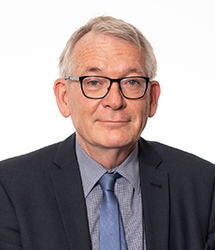
David Marsh
Chairman and Co-Founder
OMFIF
David Marsh
Chairman and Co-Founder
OMFIF
David Marsh is Chairman and Co-Founder of OMFIF. Before starting at OMFIF in late 2009, he worked for City merchant bank Robert Fleming, corporate finance boutique Hawkpoint, German management consultancy Droege and London investment firm London & Oxford. Marsh took over the chairmanship from John Plender on 1 January 2018 having been Managing Director since 2014. He moved to a non-executive role following John Orchard's appointment as Chief Executive effective 1 January 2020. Marsh is a Board Member of the British Chamber of Commerce in Germany and visiting Professor at Sheffield University and King's College London. He is former co-founder, chairman and deputy chairman of the German-British Forum. He was made Commander of the British Empire in 2000 and was awarded the German Order of Merit (Bundesverdienstkreuz) in 2003. He started his career at Reuters in 1973 having graduated with a BA in chemistry from The Queen's College Oxford. Between 1978 and 1995 he worked for the Financial Times in France and Germany, latterly as European Editor in London. Marsh has written six books: Six Days in in September - Black Wednesday, Brexit and the Making of Europe (2017, with William Keegan and Richard Roberts); Europe's Deadlock: How the Crisis Could Be Solved - And Why It Won't Happen (2013); The Euro - The Politics of the New Global Currency (2009 - re-released in 2011 as The Battle for the New Global Currency); Germany and Europe - The Crisis of Unity (1994); The Bundesbank - The Bank that Rules Europe (1992); and Germany - Rich, Bothered and Divided (1989 - re-released in 1990 as The New Germany.

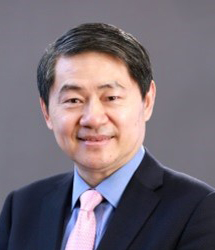
Huiyao Wang
Founder and President
Center for China and Globalization
Huiyao Wang
Founder and President
Center for China and Globalization
Dr. Huiyao (Henry) Wang is Founder and President of the Center for China and Globalization (CCG), a Counselor to China State Council appointed by Chinese Premier; Vice Chairman of China Association for International Economic Cooperation under the Ministry of Commerce; Director of Chinese People’s Institute of Foreign Affairs and Dean of Institute of Development Studies of Southwestern University of Finance and Economics of China. He also sits on the Steering Committee of Paris Peace Forum, and on the Advising Board of Duke-Kunshan University, and the Advising Board of Richard Ivey Business School of Canada. He served as an expert for World Bank, IOM and ILO, Chief Trade Representative for the Quebec Government Office in Hong Kong and Greater China, Director of Asia at SNC-Lavalin, and Vice President at AMEC-AGRA in Canada.
Dr. Wang pursued his PhD degree at University of Western Ontario and University of Manchester. He was a Visiting Fellow at the Brookings Institution, a Senior Fellow at Harvard Kennedy School and a Senior Fellow at Asia-Pacific Foundation of Canada. His latest English books include The Globalization of Chinese Enterprises: Trends and Characteristics (Springer, 2020); Handbook on China and Globalization (Edward Elgar Publishing, 2019) etc. Dr. Wang is a frequent speaker at international events such as the World Economic Forum, Munich Security Conference, Paris Peace Forum, WTO Public Forum, Munk Debate, Berlin Foreign Policy Forum, and Milken Global Forum.

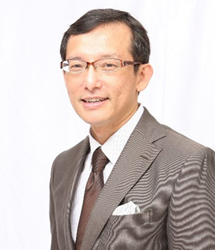
Simon Tay
Chairman
Singapore Institute of International Affairs
Simon Tay
Chairman
Singapore Institute of International Affairs
Simon SC Tay is a public intellectual as well as an advisor to major corporations and policy-makers. Based in Singapore, he is Chairman of the Singapore Institute of International Affairs, the country’s oldest think tank that has been ranked as the best independent think tank in Asia. He is concurrently a tenured Associate Professor, teaching international law at the National University of Singapore Faculty of Law and has also taught at Harvard Law School, the Fletcher School and Yale University. Prof Tay is also Senior Consultant at WongPartnership, a leading Asian law firm of some 300 lawyers and with offices in ASEAN, China and the Middle East. He served on boards for leading global companies including MUFG Bank of Japan, Toyota Japan, and Deutsche Boerse (Asia), and was previously Corporate Advisor to Temasek Holdings (2006-09). Prof Tay is appointed as an Ambassador for Singapore, currently accredited to Greece on a non-residential basis. From 1992 to 2019, he served in a number of public appointments for Singapore including as Chairman of the National Environment Agency (2002-08); an Expert and Eminent Person in the ASEAN Regional Forum (2002–2019); an independent Member of Parliament (1997-2001); and to coordinate the country’s equivalent of the Peace Corps (1990-93).


Christopher Mattheisen
General Manager
Microsoft Hungary
Christopher Mattheisen
General Manager
Microsoft Hungary
Christopher Mattheisen was appointed General Manager for Microsoft Hungary in March 2019. Mr. Mattheisen has held senior leadership roles in telecommunications and IT for over 20 years. He started his career launching Westel 900 in Hungary, and moved on to marketing, sales and strategy roles at other operators in Europe, including Era GSM in Poland, MediaOne International, BT Cellnet (O2) as well as two IT startups in the UK and the US. He returned to Hungary to run the fixed line business of Magyar Telekom in 2002; and was named CEO in 2006. He led Telekom successfully for 12 years until 2018.

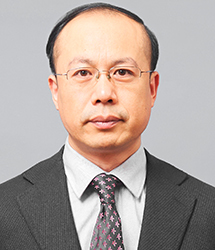
Zhimin Chen
Vice President
Fudan University
Zhimin Chen
Vice President
Fudan University
Prof. CHEN Zhimin is Vice President of Fudan University, Shanghai, China and is in charge of international affairs. He is also vice president of Chinese Association of International Studies. He serves as editor-in-chief of Chinese Political Science Review. His research interests include international relations theory, diplomacy studies, Chinese foreign policy and EU studies. His major publications in Chinese include: China, the United States and Europe: Cooperation and Competition in a New Trilateral Relation (2011, first author); Contemporary Diplomacy (2008, first author); Foreign Policy Integration in European Union: An Mission Impossible? (2003, first author); Subnational Governments and Foreign Affairs (2001). He also co-edited (with David Zweig) China's Reforms and International Political Economy (Routledge, 2007). Professor Chen received all his degrees from Fudan University. He was a visiting fellow at Harvard University (1996-1997), also visiting scholar at Queen’s University, University of Durham, Lund University, Sciences Po. and Keio University. He was made a Chevalier dans L’Ordre des Palmes Academiques by the French Government in 2006.

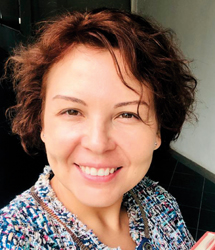
Roza Nurgozhayeva
Former Vice President-General Counsel and Professor of Law
Nazarbayev University
Roza Nurgozhayeva
Former Vice President-General Counsel and Professor of Law
Nazarbayev University
Dr. Roza Nurgozhayeva works at Nazarbayev University, Kazakhstan. From 2018 till 2020, Dr. Nurgozhayeva held the position of a Post-Doctoral Fellow at the Center for Asian Legal Studies, the National University of Singapore Faculty of Law. Before joining academia, Dr. Nurgozhayeva practiced law for more than seven years. She completed her bachelor’s degrees in law (cum laude) and economics in Kazakhstan and LL.M. at Cornell Law School. She holds a Doctor of the Science of Law (J.S.D.) degree from Cornell University. Her research interest includes comparative corporate law, corporate governance, state-owned enterprises, sustainable development, and comparative legal systems. Her recent article “Rule-Making, Rule-Taking or Rule-Rejecting under the Belt and Road Initiative: A Central Asian Perspective” was listed in the Best of 2020 law articles from Oxford University Press in the sub-category Comparative Law.

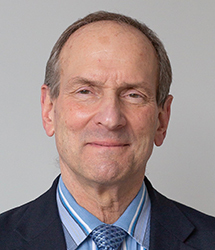
Timothy O’Connor
Director of the Center of Competency
National University of Science and Technology MISIS (NUST MISIS)
Timothy O’Connor
Director of the Center of Competency
National University of Science and Technology MISIS (NUST MISIS)
Dr. Timothy Edward O’Connor is currently the director of the Center of Competency at the National University of Science and Technology MISIS (NUST MISIS), a position that he has held since 16 June 2021. From 1 August 2009 to 15 June 2021, he was the vice rector of Academic Affairs at the NUST MISIS. Dr. O’Connor earned his PhD from the University of Minnesota, focusing on Russian Studies, particularly the history of Soviet Russia. For several decades he worked at the University of Northern Iowa, first as assistant professor, associate professor, and professor in the Department of History and then as director of International Programs. Dr. O’Connor has published a number of scholarly books, articles, and book reviews on Russian history and has given numerous interviews both in Russia and abroad on Russian higher education. He was awarded honorary professorships at the A. I. Herzen State Pedagogical University in St. Petersburg in 1992; the International University in Moscow in 2000; the Moscow State Institute of Steel and Alloys in 2002; and the Moscow State Linguistics University in 2003.
Dr. O’Connor first traveled to Russia in 1975 and thus has been associated with Russian institutions of higher education, primarily in Moscow and St. Petersburg, for forty-six years. Most of this experience has been based on his long-time involvement with American Councils for International Education: ACTR/ACCELS, an educational organization established in the mid-1970s for the purpose of promoting Russian Studies in the US and administering academic exchanges at all levels between Russia and the US.

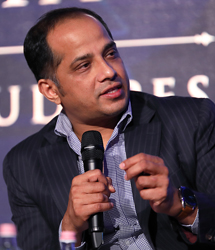
Sopnendu Mohanty
Chief FinTech Officer
Monetary Authority of Singapore
Sopnendu Mohanty
Chief FinTech Officer
Monetary Authority of Singapore
Sopnendu Mohanty, currently the Chief Fintech Officer at the Monetary Authority of Singapore, is responsible for creating development strategies, public infrastructure, and policies around technology-driven innovation. Mohanty has over two decades of public and private sector experience in technology, operations, digital Finance, and investment strategies. Mohanty extensively engages with global technology and financial services ecosystems and has championed notable collaborative public goods like API Exchange (APIX), Singapore Fintech Festival, Payment Rails, Data exchange platforms, and experimental programs like UBIN. In addition, Mohanty advises many international global advisory bodies on Fintech, Innovation and Inclusion. Within five years of his leadership, Singapore has become a leading global Fintech hub producing unicorns and home to many vibrant fintech companies. He has co-authored several patented works in the application of digital technology in Finance and won many industry recognitions.

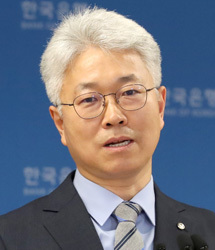
Yang Su Park
Director General
Economic Research Institute Bank of Korea
Yang Su Park
Director General
Economic Research Institute Bank of Korea
Yang Su PARK is the director general of Economic Research Institute of Bank of Korea. Prior to this position, he led the Economic Statistics Department as a director general for three years(2018-2021). He had joined Bank of Korea in 1991 and worked most of his career as a head and senior economist at the Research Department and Financial Stability Department. His work has covered a wide range of issues including economic forecasting, macroeconomics, monetary economics, finance, public finance, financial stability, and international economics. He wrote various academic and policy discussion papers on those areas and two books, Economic Forecasts in Practice, Heretical Economics for the Capital in the 21st Century. He taught a couple of courses at the Korea University and worked as a research associate at the Regional Application Lab(joint venture between University of Illinois and Chicago Fed). He graduated from Korea University and received his Ph.D in economics at the University of Illinois.

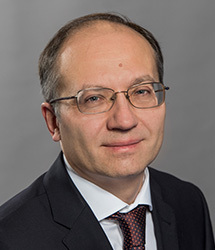
Alexander Morozov
Director
Research and Forecasting Department Bank of Russia
Alexander Morozov
Director
Research and Forecasting Department Bank of Russia
YIn the early 1990s, Alexander defended his dissertation in economics at the Institute of Economics of the Russian Academy of Sciences and received a diploma from the London School of Economics. After that, he has been engaged in research work at the Russian Academy of Sciences for about 10 years. In the period from 1994 to 2005, Alexander worked as a senior adviser on economics in the field of macroeconomics and budget policy at the World Bank, then transferred to the position of chief economist for Russia and the CIS countries at HSBC Holding. Since September 2015, he has been Director of the Research and Forecasting Department at the Bank of Russia. Alexander Morozov has numerous publications in Russian and international economic journals, a series of studies on macroeconomics and budget policy.

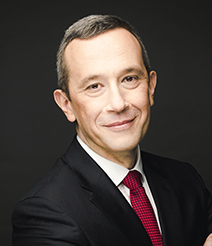
Radosław Kedzia
Vice president
Huawei CEE & Nordic region
Radosław Kedzia
Vice president
Huawei CEE & Nordic region
Radoslaw Kedzia was appointed as Regional Vice President of Central Eastern Europe and Nordic Region in H2 of 2019. He was the first European manager to be appointed as Huawei General Manager. He has been working for Huawei since 2008. Mr. Kedzia began his career in Huawei Kenya as Chief Operating Officer, then as a Regional Technical Director for the Eastern and Southern Africa Region, in 2013 he became a Chief Executive Officer in Uganda Representative Office and in 2015 was appointed as the CEO of Czech Representative office. Before his career in Huawei, Mr. Kedzia worked in Poland for PTC and TPSA and later, since 1999 in international, technical and managerial posts for Ericsson, Safaricom and Siemens in various countries such as Kenya, Israel, Great Britain, Spain and Czech Republic. His hobbies are music, art and reading.

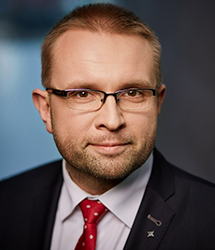
Mateusz Rykała
Vice President of the Management Board
Katowice Special Economic Zone
Mateusz Rykała
Vice President of the Management Board
Katowice Special Economic Zone
Mateusz Rykała is a Sosnowiec resident, local government activist. Since 2017, he has been Vice President of the Management Board of the Katowice Special Economic Zone S.A.. Development programming specialist. From 2014 to 2017, he was the 1st Deputy Mayor of Sosnowiec responsible for investments, investor support and promotion. From 2010 to 2014, ha was Chairman of the City Council of Sosnowiec. In the years 2009 to 2014, he was the President of the Management Board of the Regional Eco-development Fund S.A. in Bielsko-Biała. Between 2006 and 2009, Plenipotentiary of the Sosnowiec Mayor for Development and International Cooperation. Between 2004 and 2006, sub-inspector at the Development Programming and European Funds Department of the Marshal's Office, Śląskie Voivodeship. He has experience in Supervisory Boards of e.g. NPGK Świętochłowice Sp. z o.o., TBS Centrum Będzin Sp. z o.o., Sosnowiec Pediatrics Center Sp. z o.o., Silesian Trams in Chorzów S.A. A graduate of History at the University of Silesia, Enterprise Management at PARP, MBA at the WSB Academy. He speaks English and Italian.

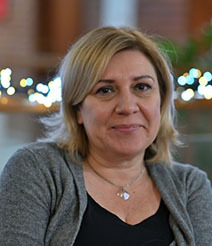
Sandra Kučina Softić
President
European Distance and E-Learning Network (EDEN)
Sandra Kučina Softić
President
European Distance and E-Learning Network (EDEN)
Dr. Sandra Kučina Softić is President of European Distance and E-learning Network EDEN, elected in 2019. She has been a member of EDEN Executive Committee since 2013 and in 2014 she received the EDEN Fellow Title.
She is the Assistant Director for Education and User Support at the University of Zagreb University Computing Centre SRCE (Croatia). She is also the Head of the E-learning Centre at SRCE. She has 25 years of experience working in higher education. Her work is focused on monitoring and fostering e-learning in Croatian higher education and providing support and advice to institutions, teachers and students in implementation of new technologies in learning and teaching. She was appointed Croatian representative in ET2020 Working group on Digital Skills and Technologies (2016-2018) and in ET2020 Working group on Digital Education: learning, teaching and Assessment (2018-2020). In 2018 she was appointed member of European Education and Training Expert Panel.
Her field of interest is strategic decision making related to digital education implementation in higher education and enhancement of digital skills of teachers. She is also active in field of open education. She has been involved in a number of projects (national and international) related to these fields and she actively presents at international conferences. She is author of training courses for teachers and speaker at conferences. In 2021, she authored the book on digital transformation in higher education published in Croatian.
She has a master’s degree in Digital Education at the University of Edinburgh (United Kingdom) and PhD in Information and Communication Technologies at the University of Zagreb (Croatia).

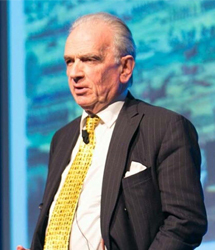
Paolo Borzatta
Member of the Board
The European House Ambrosetti
Paolo Borzatta
Member of the Board
The European House Ambrosetti
Paolo Borzatta is Member of the Board of The European House – Ambrosetti. He is an expert in corporate strategy, international strategy, city and territorial strategy, creativity in strategy.
He assisted several of the world’s largest companies in the development of their strategies. He has worked and lived in the United States, the United Kingdom, Russia, and China. In the last years, he has also been involved in strategic projects in Asia and in Africa. A substantial part of his advisory activity has been devoted to assisting European and Chinese enterprises in entering (respectively) the Chinese and European markets.
After having received his degree in Nuclear Engineering from Politecnico di Milano in 1970, he was assistant professor of Subnuclear Physics at the University of Milan. In 1975, he got an MBA from Manchester Business School. After his academic career, he has served as Executive President of the Plastic Pipe Division of Dalmine. In 1984, he started his professional activity as a strategy consultant.
The European House - Ambrosetti is a professional Group, operating since 1965 providing strategy consulting, strategic scenarios, and studies to European and Asian institutions and enterprises. In addition, it organizes high-level content-based events.

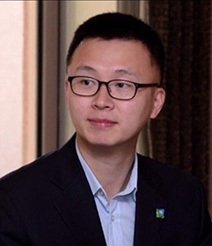
David Zeng
Director of Corporate Affairs
Merck Holding (China) Ltd., China
David Zeng
Director of Corporate Affairs
Merck Holding (China) Ltd., China
David Zeng takes charge of the corporate affairs and government relations of Merck Electronics business in Central and Southern provinces of China. He also provides policy researches and analysis on major political, economic and societal issues that influence Merck’s business in China.
In the Central and Southern provinces of China, the advanced chemical industry, semiconductor and new display industries are highly concentrated, which are of strategic priority of Merck sustainable development in China.
David joined Merck in Feb 2018 and is overseeing the corporate affairs and government relations, engaging with regional government departments and industrial counterparts in these areas to secure the smooth operation and explore the business opportunities for Merck in China.
Before joining in Merck, David Zeng used to serve in China’s Ministry of Foreign Affairs in multiple posts, and later work for companies including Saudi Aramco and Xiaomi Technology.

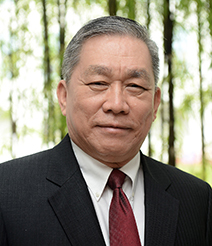
Paul Cheung
Director, Asia Competitiveness Institute
Professor, Lee Kuan Yew School of Public Policy, National University of Singapore
Paul Cheung
Director, Asia Competitiveness Institute
Professor, Lee Kuan Yew School of Public Policy, National University of Singapore
Professor Paul Cheung is Director of Asia Competitiveness Institute (ACI) and Professor, Lee Kuan Yew School of Public Policy, National University of Singapore (NUS). In this role, he leads a team of researchers examining the socioeconomic development prospects of Singapore and the Asia region.
Before his NUS appointment, Professor Cheung was the Director of United Nations Statistics Division (UNSD) at the United Nations Headquarters in New York (2004-2012). At the UN, he facilitated the development of the global statistical system and coordinated the work of the United Nations Statistical Commission. He supervised a programme of work that included developing international statistical standards and disseminating global statistical data. He also had the responsibility of implementing UN mandates on geospatial information, cartography, and geographic names. In 2011, he successfully implemented an inter-governmental platform on Global Geospatial Information Management (GGIM) to address multilateral issues on geospatial information.
Professor Cheung has received many national and professional awards for his work around the world.

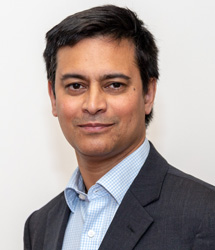
Rana Mitter
Director
University of Oxford China Centre
Rana Mitter
Director
University of Oxford China Centre
Rana Mitter is Professor of the History and Politics of Modern China, and a Fellow of St Cross College at the University of Oxford. He is the author of several books, including China’s War with Japan: The Struggle for Survival, 1937-1945 (Penguin, 2013), [US title: Forgotten Ally] which won the 2014 RUSI/Duke of Westminster’s Medal for Military Literature, and was named a Book of the Year in the Financial Times and Economist. His latest book is China’s Good War: How World War II is Shaping a New Nationalism (Harvard, 2020). His writing on contemporary China has appeared recently in Foreign Affairs, the Harvard Business Review, The Spectator, The Critic, and The Guardian. He has commented regularly on China in media and forums around the world, including at the World Economic Forum at Davos. His recent documentary on contemporary Chinese politics "Meanwhile in Beijing" is available on BBC Sounds. He is co-author, with Sophia Gaston, of the report “Conceptualizing a UK-China Engagement Strategy” (British Foreign Policy Group, 2020). He won the 2020 Medlicott Medal for Service to History, awarded by the Historical Association, is a Fellow of the British Academy, and an Officer of the Order of the British Empire.

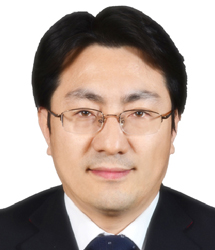
Sang-Hyun Jang
Director
Korea Education and Research Information Service
Sang-Hyun Jang
Director
Korea Education and Research Information Service
Overview
Dr. Sanghyun Jang, a Executive Director of the KERIS(Korea Education & Research Serivice) that is belong to the MOE(Ministry of Education). He is a specialist in the field of computer education and is currently working as a advisor at the Presidential Council on commission of education for Digital Education. He is working urgently a Chief Manager on the UDEC(University Distance Education Center) project for supporting all universities during COVID-19 Pandemic. His major is computer engineering and he has the certificate for teaching in secondary school.
Focus of Work
Dr. Jang is interested in using the latest technologies(ex: AI, Bigdata, AR/VR etc) in education. He has conducted extensive research over matters related to e-learning platforms. He is His focus has been on various aspects and the usage of AI in contemporary education.
Areas of Expertise
Dr. Jang was the specialist of Presidential Council on Information Society in Korea 10 years ago. The Council makes strategies of the national information technology. Especially, he has worked to prepare the report to advise the President about the innovation of education system using ICT(The strategies of SMART Eeducation).
He used to be a director at KERIS, at which he has conducted a various of the project, CHLS(Cyber Home Learning System), ERSS(Education Resources Sharing System), RISS(Research Information Sharing System), KOCW(Korea Open CourseWare), ACU(Asean Cyber University) etc. He used to be a lecturer of the university and a committee member of the computer education society.
Contact Information
Office Address: 8th Floor, KERIS Building, 64 Dongnae-Ro,
Dong--Gu, Daegu 110-755, Korea
Office telephone: +82-53-714-0373
Mobile: +82-10-3780-0918
Email: shjang@keris.or.kr

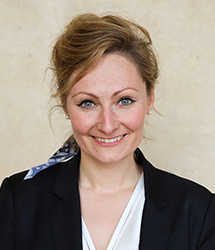
Linda Zeilina
Founder and CEO
International Sustainable Finance Centre
Linda Zeilina
Founder and CEO
International Sustainable Finance Centre
Overview
Linda Zeilina is the CEO & Founder of the International Sustainable Finance Centre (ISFC), an independent, apolitical and expertise-led think tank working on sustainable finance topics. Linda is a Fellow at the RSA in London, an advisory board member at RoSIF, and a member of Agora Energiewende's Council on Sustainable Finance. Previously, Linda was a Director at Re-Define, a London-based boutique financial consultancy.

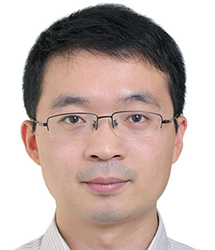
Lin Cheng
Director
Center for International Collaborations of the Beijing Institute of Finance and Sustainability
Lin Cheng
Director
Center for International Collaborations of the Beijing Institute of Finance and Sustainability
Cheng Lin is Director of Center for International Collaborations at the Institute of Finance and Sustainability (IFS), Head of Secretariat Beijing Office for the Green Investment Principles (GIP) for the Belt and Road. He has been leading the Global Green Finance Leadership Program (GFLP), a platform for capacity building and knowledge sharing on green finance. working under the G20 Green Finance Study Group (2016 - 2018) and the G20 Sustainable Finance Working Group (2021- ) and the Network for Greening the Financial System (NGFS) since 2017. Prior joining the IFS, he served as Deputy Director of Research Center for Green Finance Development at PBC School of Finance of Tsinghua University between 2017 and 2021. Before that, he was with the PBOC from 2010 to 2017, including the International Department and Haikou Central Sub-branch. From 2014-15, he was Deputy Representative at the PBOC Representative office in Tokyo. He received bachelor’s degree of Arts in English Language and Literature and minor courses in International Trade in 2008 from Wuhan University, and master’s degree of Arts in English from Shanghai International Studies University in 2010.

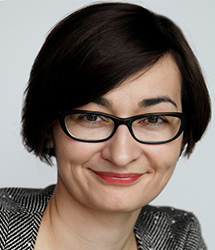
Justyna Czyszek
Vice Director of the Investor Support Department
Kraków Technology Park Special Economic Zone, Poland
Justyna Czyszek
Vice Director of the Investor Support Department
Kraków Technology Park Special Economic Zone, Poland
Deputy Director at the Krakow Technology Park, one-stop-shop for businesses in Małopolska Region of Poland. Justyna Czyszek is an attorney-at-law, with experience in investment projects for Polish and foreign companies, especially those interested in the Polish Investment Zone. Graduate of Jagiellonian University and the U.S. Legal Studies LLM Program at the University of Connecticut School of Law.

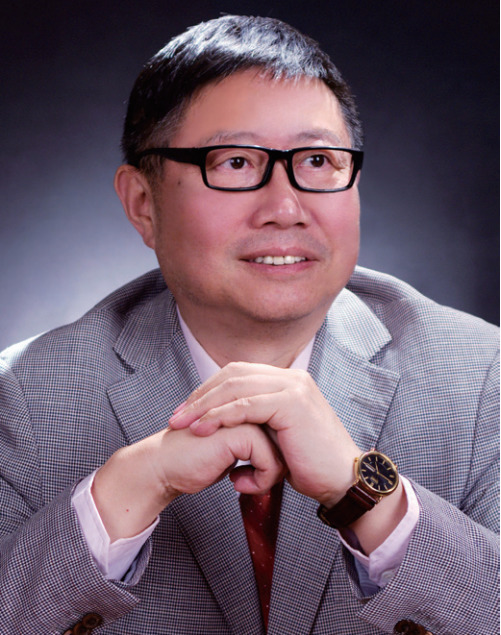
Zongxian FENG
Professor and Chief Expert of BRI
Xi’an Jiaotong University
Zongxian FENG
Professor and Chief Expert of BRI
Xi’an Jiaotong University
Dr. Feng Zongxian is currently a professor and doctoral tutor at the School of Economics and Finance of Xi'an Jiaotong University. He is the director of the Institute of the “Belt and Road” and for Global Development of Xi'an Jiaotong University. He is also an expert in international trade of the Ministry of Commerce and a member of the Shaanxi Provincial Government Advisory Committee. His research directions consist of international trade, international finance, construction of free trade zone, the development of the “Belt and Road”, etc. Professor Feng Zongxian presided a great number of research projects of national, provincial and ministerial levels, having published many monographs and textbooks. He has published more than 100 essays in journals such as World Economy, China Economic Quarterly, The Journal of Quantitative & Technology Economics, Journal of International Trade and so on, owning rich theoretical and practical experience.
Since the establishment of Institute of “Belt and Road” and Global Development in Xi'an Jiaotong University, the Institute has made full use of the advantages of scientific research and teaching of Xi'an Jiaotong University. Based on the team of economic discipline in the School of Economics and Finance, it has closely connected XJTU, domestic and foreign universities and institutes. With the primary purpose of consulting services and the main task of researching and consulting policy, it has cooperated vigorously with the Ministry of Foreign Affairs, the National Development and Reform Commission, the Ministry of Commerce and several relevant departments and regions like Shaanxi, Xinjiang, Ningxia and Xi'an, etc. In-depth and fruitful communication and exchanges have been realized in the fields of cooperation of economy, finance, energy, education, science and technology, transportation and logistics, ecology and tourism culture. The institute has played the role as a platform in public diplomacy, policy coordination, investment promotion and project docking, and has expanded exchanges and cooperation between China and countries around the world, making a series of important achievements.


Glenn Diesen
Professor
University of South-Eastern Norway
Glenn Diesen
Professor
University of South-Eastern Norway
Glenn Diesen is a Professor at the University of South-Eastern Norway (USN), and an editor at the Russia in Global Affairs journal. His research focus is on the geoeconomics of Russia’s Greater Eurasia Initiative and Russian conservatism.
Diesen’s latest books are: Europe as the Western Peninsula of Greater Eurasia (2021); The Return of Eurasia (2021); Russian Conservatism (2021); Great Power Politics in the Fourth Industrial Revolution (2021); Russia in a Changing World (2020); The Decay of Western Civilisation and Resurgence of Russia (2018); Russia’s Geoeconomic Strategy for Greater Eurasia (2016); EU and NATO relations with Russia (2015).


Sixuan Li
Founder of ViaVia Shopping & Financial Commentator at CCTV Business
China Central Television CCTV Business
Sixuan Li
Founder of ViaVia Shopping & Financial Commentator at CCTV Business
China Central Television CCTV Business
A media and finance professional with experience as an entrepreneur in the retail / service sectors, founder of e-commerce startup ViaVia.
Young Global Leader, World Economic Forum
Bilingual Anchor, Reporter, Financial Commentator, China Central Television CCTV Business Channel (CCTV2)
Extensive experience in conducting high-level interviews with world leaders, business executives and entrepreneurs, leading/producing special coverage reports and moderating industry forums at the annual World Economic Forum, G20 summit, APEC summit, BoAo Forum for Asia, China Development Forum, World Internet Conference, Yabuli China Entrepreneurs Forum, etc.
Former Correspondent, CNBC Asia. Former Investment professional, KKR and Lehman Brothers Private Equity; Investment banking experience, UBS and JPMorgan Securities; BA in Economics and Mathematics, Columbia College, Columbia University, New York, Kluge scholar full scholarship.

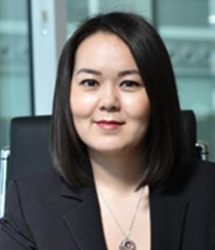
Asel Nurakhmetova
Advisor
AIFC Green Finance Centre
Asel Nurakhmetova
Advisor
AIFC Green Finance Centre
Asel Nurakhmetova is an Advisor at the AIFC Green Finance Centre. She has 12 years of work experience in trade, economy and finance, including 5 years in green finance. Asel previously worked at the central bank of Kazakhstan, and the Ministry of Economy of Kazakhstan. Asel drafted the regulation on Green Bonds, which are implemented by the Astana International Exchange. She led work on introducing Green Finance and Green Taxonomy in a new environmental legislation. Asel has a degree in international relations from the Lancaster University and is a certified Green and Sustainable Finance Professional (CISI + Chartered Banker).

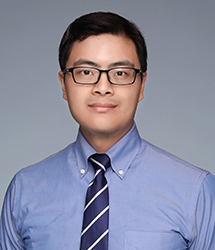
Wenhong Xie
Head of China
Climate Bonds Initiative
Wenhong Xie
Head of China
Climate Bonds Initiative
Wenhong Xie is CBI’s China Programme Manager and is based in Beijing. He is responsible for leading the management and development of CBI’s projects and business in mainland China. In addition to managing research projects and liaising with government agencies, multilateral organizations, verifiers, underwriters and institutional investors, Wenhong also provides advice on green bond issuance and certification to support potential green bond issuers such as banks, state-owned enterprises, municipalities, and large corporates. Prior to joining CBI, he worked as an economist at Tsinghua’s Center for Finance and Development (led by Dr. Ma Jun) and a consultant for the International Finance Corporation, in addition to a number of think tanks and NGOs in environment and international development. Wenhong has a M.A. in International Policy Studies from Stanford University.

MODERATORS
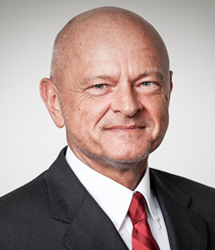
Mihály Patai
Deputy Governor
Magyar Nemzeti Bank
Mihály Patai
Deputy Governor
Magyar Nemzeti Bank
Dr. Mihály Patai has been Deputy Governor of the Magyar Nemzeti Bank (The Central Bank of Hungary), and Member of the Monetary Council from 22 April 2019. Until April 2019, he was the President of the Hungarian Banking Association, and the Chairman & CEO of UniCredit Bank Hungary since 2006. From 1996 to 2006, he was Chairman & CEO of Allianz Hungaria Insurance. From 1993 to 1995, he served as Executive Director of Kereskedelmi Bank, and from 1988 to 1993, he worked as assistant to the Executive Director of World Bank.
He graduated from the Budapest University of Economics. He studied under scholarships in London, Vienna and Moscow.
He is the Chairman of the Budapest Stock Exchange, Chairman of the Board of Directors at GIRO Zrt. and Vice President of the Hungarian Economic Association.

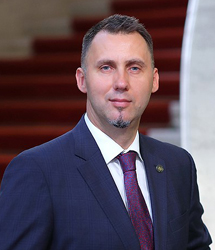
Barnabás Virág
Deputy Governor
Magyar Nemzeti Bank
Barnabás Virág
Deputy Governor
Magyar Nemzeti Bank
Barnabás Virág is Deputy Governor of the Magyar Nemzeti Bank responsible for monetary policy and financial stability. From 2015 until his appointment as Deputy Governor, he served as Executive Director of the MNB responsible for monetary policy and economic analysis. Between 2013 and 2015, he was Director of the MNB responsible for economic analysis. From 2003, he worked as an Analyst at the MNB. Prior to that, he taught at the Budapest University of Economics and State Administration (today Budapest Corvinus University) and was an Analyst at the Ministry of Finance. In 2017, he was awarded the Popovics Prize. He completed his studies at the Budapest University of Economics and State Administration.

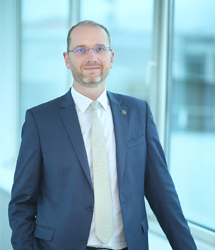
Csaba Kandrács
Deputy Governor
Magyar Nemzeti Bank
Csaba Kandrács
Deputy Governor
Magyar Nemzeti Bank
Dr. Csaba Kandrács is Deputy Governor of the Central Bank of Hungary, responsible for financial institutions supervision and consumer protection. He started his professional career as a financial expert at the Hungarian Ministry of Finance in 2003, then joined the Budapest 5th District Local Government in 2009 as Head of the Financial Unit. In 2012, he was appointed Deputy State Secretary of the Hungarian State Treasury at the Ministry for National Economy and later in that year, he became the President of the Hungarian State Treasury. In 2013, he was appointed as a Member of the Monetary Council, then he became the Chairman and CEO of MARK Ltd., the asset management company established by the Central Bank of Hungary. From 2016, he served as Executive Director of the Central Bank of Hungary responsible for the supervision of financial institutions, and also as a member of the Financial Stability Council. On 2nd October 2019, he was appointed as the Deputy Governor responsible for financial institutions supervision and consumer protection of the Central Bank of Hungary and also as a member of the Monetary Council and continue to serve as a member of the Financial Stability Council.
Since June 2016, he has been a Member of the Board of Supervisors of the European Banking Authority. From 2017, he has been a Member of the Group of Banking Supervisors from Central and Eastern Europe. From 2013 to 2014, then from 2019 to this date, he has served as a Member of the Board of Directors of GIRO Ltd, the automated clearing house operator in Hungary. From 2018, he has been the Chairman of the Supervisory Board of BISZ Central Credit Information Plc. From 2019 to this date, he has been the Chairman of the Board of Directors of OBA, the Hungarian central deposit insurance company and a member of the Board of Directors of the Hungarian Reorganisation Found of credit institutions.
Csaba Kandrács earned a degree in public administration management at Public Administration College of Budapest in 2003, a degree in law at University of Pécs in 2007, and a degree in economics at Szent István University of Budapest in 2014.

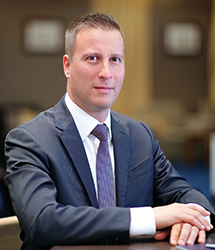
Dániel Palotai
Executive Director
IMF
Dániel Palotai
Executive Director
IMF
Dániel Palotai is an economist. He earned his Master’s degree at the Corvinus University of Budapest. He began his professional career at Magyar Nemzeti Bank, the central bank of Hungary, then from 2007, he went on to work at the European Central Bank. From November 2010 he was Head of the Macroeconomic Policy Department of the Ministry for National Economy and was actively involved in the development of Hungary’s Structural Reform Program. In March 2013 Dániel Palotai re-joined the Magyar Nemzeti Bank to become Executive Director and the Bank’s Chief Economist. In 2015, he received the Popovics Sándor award, which is a prestigious recognition awarded to young economists under the age of 45. He was a member of the Monetary Policy Committee (MPC) of the European Central Bank and a member of the Economic and Financial Committee (EFC) of the European Union.
In October 2020 Dániel Palotai was elected to serve as an Executive Director of the International Monetary Fund (IMF). In his capacity as a Member of the Executive Board, he represents the Constituency of the Central and Eastern European countries.

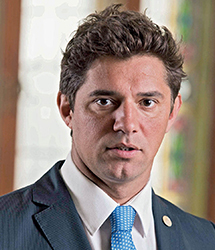
Norbert Csizmadia
President of the Board of Trustees
PADME
Norbert Csizmadia
President of the Board of Trustees
PADME
Norbert Csizmadia (PhD) is the President of the Board of Trustees at the Pallas Athéné Domus Meriti Foundation (PADME) and the Chairman of the Board of Trustees of the John von Neumann University of Kecskemét. He is a geographer and expert in economic strategy, regional and urban development, and geopolitics. He is the author of the book, Geofusion – The Power of Geography and Mapping of the 21st Century and Editor-in Chief of HUG (Hungarian Geopolitics) magazine. He is a Member of the International Advisory Board of the “Belt and Road and Global Governance” in the Fudan Development Institute, Shanghai. He is the independent director of Bank of China Hungary.
He was the executive director of the Magyar Nemzeti Bank (Central Bank of Hungary) in charge of economic strategy and planning from 2013 to 2016. From 2012, Norbert Csizmadia was State Secretary for economic planning coordination in the Ministry for National Economy. From 2010, he was the head of the Strategic Think Tank and later the Deputy State Secretary for economic planning. He was Secretary of the Economic Consultation from the autumn of 2005. He was co-author and coordinator of the discussion paper “Vision Hungary 2025” and Chief coordinator of the development of the New Széchenyi Plan (2010-2020). From 2004, he was a member of the Team Europe expert committee established by the European Commission in the topic of regional policy. From 2000, he was the head of the Deputy State Secretariat for Regional Economic Development in the Ministry for National Economy.

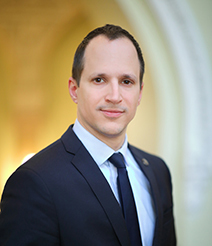
Péter Fáykiss
Director
Magyar Nemzeti Bank
Péter Fáykiss
Director
Magyar Nemzeti Bank
Mr. Fáykiss graduated in 2009 from Corvinus University of Budapest. Between 2009 and 2013 he worked at the MNB, where he was the member of a group analysing domestic effects of the European implementation of Basel III regulation. In 2013 he became the Deputy Head of Division for Financial Regulations of Ministry for National Economy, where he was mainly responsible for the domestic implementation of the European regulatory package CRD IV and for the preparation of the new Hungarian Banking Act. In 2014 he was appointed as the Head of Macroprudential Policy Department of the MNB, from 2017 he served as the Director of Macroprudential Directorate, and from 2019 he is the Director of Digitalization Directorate at the MNB.

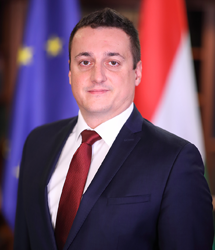
Kristóf Lehmann
Director
Magyar Nemzeti Bank
Kristóf Lehmann
Director
Magyar Nemzeti Bank
Kristóf Lehmann has been the Head of the Directorate for International Monetary Policy Analysis and Training of Economic Sciences at the Central Bank of Hungary (Magyar Nemzeti Bank) since 2019. His responsibilities include the representation of the Central Bank of Hungary in the International Relations Committee of the European Central Bank, along different educational and research projects mostly as the leader of the MNB Tudásközpont - MNB Intézet, a university Department first active at the Corvinus University of Budapest (2017-2021), then at Neumann János University (since 2021 Autumn).
He graduated at the Corvinus University of Budapest, Faculty of Economic Sciences, with a specialization in European Integration and World Economic Adaptation. He completed his PhD in 2014 at the Multidisciplinary Doctoral School of International Relations of the Corvinus University of Budapest. Mr. Lehmann earned an MBA from the Maastricht School of Management in 2020.
He started his career at the Hungarian Development Bank (Magyar Fejlesztési Bank) in 2006. From 2008, he worked as an emerging market economic analyst for German DZ Bank (from Takarekbank Budapest). Between 2010-2011, he was a researcher at Waseda University in Japan on a doctoral scholarship. He joined the Central Bank of Hungary in 2011. From 2014 until his current position he was the head of the Monetary Strategy Department.
In 2016, 2017 and 2020 he was awarded the ’Prize for the Central Bank of Hungary’ (Magyar Nemzeti Bankért díj).
His publications on macroeconomy are aviable both in print (Hitelintézeti Szemle, Világgazdaság) and online (https://economaniablog.hu/author/lehmannkristof/,https://www.portfolio.hu/kereses?q=&a=lehmann+krist%C3%B3f&df=1999-02-09&dt=2021-10-20&c=), in English and in Hungarian. He was also a co-author of the book ’Magyar út’ (’The Hungarian Route’).
Research Gate: https://www.researchgate.net/profile/Kristof-Lehmann MTMT:https://m2.mtmt.hu/api/publication?format=html&labelLang=hun&sort=publishedYear,desc&cond=authors;eq;10055565
LinkedIn: https://hu.linkedin.com/in/kristof-lehmann-phd

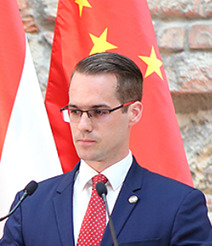
Levente Horváth
Director of Eurasia Center
John von Neumann University
Levente Horváth
Director of Eurasia Center
John von Neumann University
Levente Horváth is the founder and the Director of Eurasia Center of the John von Neumann University, Hungary. Levente Horváth is a China expert, has been dealing with China from 2005 onwards, he was doing his bachelor and master degree in tourism management in China, at the Fudan University in Shanghai, and graduated with rector’s award. From 2016 he is the Vice-President of the Fudan University Alumni. In 2017-2021, Levente Horváth was doing his PhD studies at the University of Pécs, his research field focused on the Chinese geopolitical thinking and on the One Belt, One Road initiative.
Between 2015 and 2017, he was the Consul General of Hungary in Shanghai and in this position, he was responsible for deepening the Sino-Hungarian relations. In 2017-2019 he served as the Head of Educational Department in the Magyar Nemzeti Bank, the central bank of Hungary, from 2019 he became the Chief Advisor to the Governor of the central bank of Hungary. In 2021 he was given the Shanghai Silver Magnolia Award acknowledging his contribution to Shanghai’s development with respect to its economy, trade, finance, education and culture.

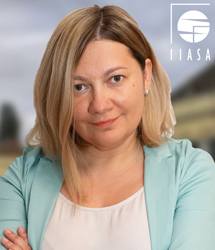
Elena Rovenskaya
Program Director
International Institute for Applied Systems Analysis (IIASA)
Elena Rovenskaya
Program Director
International Institute for Applied Systems Analysis (IIASA)
Elena Rovenskaya is Program Director of the Advancing Systems Analysis (ASA) program at the International Institute for Applied Systems Analysis (IIASA), Laxenburg, Austria. She has background in applied mathematics. Her scientific interests lie in the fields of optimization, decision sciences and mathematical modeling of complex socio-environmental systems. As the ASA Program director, Rovenskaya is leading a team of 85+ scientists who work on new systems analytical methods, which enable higher levels of agility to support policy and societal decision making.
In 2014-2020, Elena Rovenskaya led a project on Challenges and Opportunities of Economic Integration within a Wider European and Eurasian Space which focuses on plausible futures of economic cooperation in the Greater Eurasian space and interplay between different integration processes in the region.

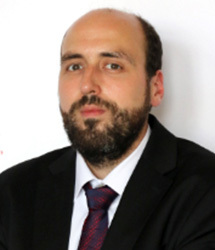
Tamás Baranyi
Deputy Director
Institute for Foreign Affairs and Trade of Hungary
Tamás Baranyi
Deputy Director
Institute for Foreign Affairs and Trade of Hungary
Baranyi Tamás has received his MA degree in History and American Studies at Eötvös Loránd University of Budapest in 2010. From 2011 he has worked at the House of Terror Museum as a historian, then, from 2012 to 2015 as Head of Research. He defended his PhD thesis in 2018 at the Department of Modern and Contemporary History at Eötvös Loránd University about the changing elbow-room of Hungrian foreign policy during the era of détente. From 2013 to 2019 he was external lecturer at the same department. From 2015 to 2020 he was Head of Research of the Antall József Knowledge Centre. From 2019 he is Adjunct Professor at Pázmány Péter Catholic University. From February 2020 he is Deputy Director for Strategy at the Institute for Foreign Affairs and Trade. His research area are the history of the United States and the Cold War, foreign political strategy, and transatlantic relations.

TOP QUOTES FROM THE E-CONFERENCE
In our view, and there is a consensus on that, all central banks and all central bankers, have their duty to encourage and to help, to support, and to accelerate the transition of our countries and economies from the old world to the new one.
György Matolcsy
Governor of the Magyar Nemzeti Bank
We see the opportunity for Eurasia to become a hub of green multilateralism.
György Matolcsy
Governor of the Magyar Nemzeti Bank
We need the fusion of Asian and Western models of innovation to solve all the challenges ahead of us.
György Matolcsy
Governor of the Magyar Nemzeti Bank
As China is establishing a new development pattern featuring „dual circulation”, the Eurasian economies are regaining confidence and recovering steadily.
Guoli Tian
Chairman and Executive Director, China Construction Bank
New development means new opportunities. New opportunities lie in connectivity, and we need to open a new chapter in economic and trade cooperation
Guoli Tian
Chairman and Executive Director, China Construction Bank
I believe green finance will keep injecting „oxygen” into green transformation and push forward the green low-carbon and sustainable development of the global economy.
Guoli Tian
Chairman and Executive Director, China Construction Bank
When it comes to the level of technological development, the East has totally closed the gap which used to be there, compared to the level of development of the so-called West.
Péter Szijjártó
Minister, Ministry of Foreign Affairs and Trade, Hungary
Hungary belongs to those countries which look at these progressive developments on the East as they are offering opportunities for us, as we have done a lot in order to make the Hungarian economy competitive during the recent years, we are absolutely interested in a free and fair global trade.
Péter Szijjártó
Minister, Ministry of Foreign Affairs and Trade, Hungary
We don’t like the approach which tries to portrait this new situation as the start of a new cold war. We do believe that we need to make friendship with the Eastern countries, or at least partnership based on mutual respect and mutual interest.
Péter Szijjártó
Minister, Ministry of Foreign Affairs and Trade, Hungary
With just 9 years left to 2030, we must act now as a global community. We must accelerate the slow-moving transformations towards greater sustainability and equity.
Zhenmin Liu
Chairman and Executive Director, China Construction Bank
Regional cooperation, as addressed at this forum, is important to promote mutually beneficial outcomes for countries, while also serving global collaboration and progress towards SDGs.
Zhenmin Liu
Chairman and Executive Director, China Construction Bank
Central banks started to change their thoughts about climate change and there is a clear trend that central banks are moving into a more greener and greener direction.
Barnabás VIRÁG
Deputy Governor, MNB
We have to prepare for innovative solutions on the one hand but on the other hand never forget the lessons from the history.
Barnabás VIRÁG
Deputy Governor, MNB
As policy makers are phasing out stimulus measures they might find it is more difficult to coordinate between monetary and fiscal policies.
Gang YI
Governor, PBOC
We should enhance policy coordination and cooperation on important global issues such as climate change.
Gang YI
Governor, PBOC
People need to open up their boxes and become more holistic.
David MARSH
Chairman and Co-Founder, OMFIF
Climate change and population ageing are probably episode and government should establish policy measures to avoid future disaster.
Yang Su PARK
Director General, Bank of Korea
We have a minimum tripolar world system today.
Parag Khanna
Bestseller Author, Expert of International Relations, Geopolitics
Competitive connectivity will potentially contribute to a new geopotical equilibrium.
Parag Khanna
Bestseller Author, Expert of International Relations, Geopolitics
Infrastructure is coming a key geopolitical arena in the next years
Parag Khanna
Bestseller Author, Expert of International Relations, Geopolitics
The new geopolitics is not only focusing on territorial issues, but also infrastructural dimensions
Parag Khanna
Bestseller Author, Expert of International Relations, Geopolitics
USA and China has the most important bilateral relations in the world
Rana Mitter
Professor of the History and Politics of Modern China, Director of the University of Oxford China Centre, University of Oxford China Centre
It is crucial what will happen regarding the climate change in Eurasia
Rana Mitter
Professor of the History and Politics of Modern China, Director of the University of Oxford China Centre, University of Oxford China Centre
Central-Asia is a bridge for Eurasia
Roza Nurgozhayeva
Former Vice President-General Counsel and Professor of Law, Nazarbayev University
The Belt and Road Initiative is a tool for the Chinese foreign policy to support the developing countires in the world.
Wang Huiyao
Founder and President, Center for China and Globalization (CCG)
One of the legacies of the sudden external shock we have seen last year is that digitalization projects, first of all digitalization, you can't survive without it.
Christopher Mattheisen
General Manager, Microsoft Hungary
Data is the new oil. If you look at the winning companies out there, they are the companies that integrate data and AI into all of their processes.
Christopher Mattheisen
General Manager, Microsoft Hungary
If you look at the winning companies out there, they are the companies that integrate data and AI into all of their processes.
Christopher Mattheisen
General Manager, Microsoft Hungary
Focus on the innovation. Be part of the change, don’t wait for the change.
Radoslaw Kedzia
Vice President of Huawei CEE & Nordic region
Those companies who will adapt the digitalization will prevail in the market and those who will not, will diminish.
Radoslaw Kedzia
Vice President of Huawei CEE & Nordic region
5G together with AI and with the big data are the 3 foundations of the Fourth Industrial Revolution.
Radoslaw Kedzia
Vice President of Huawei CEE & Nordic region
Let's hope we can focus on developing ourselves because history of humanity is a history of development.
Radoslaw Kedzia
Vice President of Huawei CEE & Nordic region
Lot of these eurasian large powers emerging, not just China and Russia, but other Eurasian powers as well, they see more incentives to work together, to diversify their economic or technological dependencies, but also to create a certain degree of technological sovereignty.
Glenn Diesen
Professor, University of South-Eastern Norway
Technology is no longer just an industry on its own, it has really become the underlying infrastructure of, I think esentially all industries.
Sixuan Li
Founder of ViaVia Shopping & Financial Commentator at CCTV Business
There is definitely a growing need for sustainable investment.
Dániel PALOTAI
Executive Director, IMF
The Budapest Eurasia Forum has developed into an important platform of high-level professional dialogue for Eurasia to deepen cooperation and achieve fruitful outcomes.
Qiang NI
Vice Governor, Hainan Provincial People's Government
As the most densely populated continent with the vastest land area and closest interconnection among countries, Eurasia possesses huge potentials for development.
Qiang NI
Vice Governor, Hainan Provincial People's Government
Eurasia is our common continent. We have two continents: Europe and Asia, but actually, physically, from a land point of view, we are sharing only one continent which is Eurasia.
Paolo BORZATTA
"Member of the Board, The European House Ambrosetti"
I see a lot of commonalities between the Western strategies for innovation and the Asian strategies.
Paolo BORZATTA
"Member of the Board, The European House Ambrosetti"
Creativity is directly connected with diversity of ideas that are exchanged.
Paolo BORZATTA
"Member of the Board, The European House Ambrosetti"
First of all, you need roads. Road is a metaphor. You need infrastructure to connect people, not only physically, but also in the cloud and the internet.
Paolo BORZATTA
"Member of the Board, The European House Ambrosetti"
The success of every venture is based on three things: the timing, the place and the harmony of the team (…). For me, (…) Eurasia today means (…) the right place (…), and we should create harmony among the people of both sides of Eurasia.
Paolo BORZATTA
"Member of the Board, The European House Ambrosetti"
We should create harmony among the people of both sides of Eurasia: Europe and Asia.
Paolo BORZATTA
"Member of the Board, The European House Ambrosetti"
There is chance for Central Europe to be a big hub of electro-mobility.
"Mateusz RYKAŁA"
Vice President of the Management Board, Katowice Special Economic Zone
Future is based on well-educated people.
"Mateusz RYKAŁA"
Vice President of the Management Board, Katowice Special Economic Zone
The only opportunity to create added value is thinking out of the box every day.
"Mateusz RYKAŁA"
Vice President of the Management Board, Katowice Special Economic Zone
China is facing a critical time of digital upgrade and digital transformation.
David ZENG
"Director of Corporate Affairs, Merck Holding (China) Ltd."
As China continues to comprehensively reform and open up, pilot free trade zones meet high standards to achieve high-quality development.
Zongxian FENG
"Professor and Chief Expert of BRI, Xi’an Jiaotong University"
Green transition should be a cooperation between countries, on a continental level, on Eurasian level and global level as well
Tamás Baranyi
Deputy Director, Institute for Foreign Affairs and Trade
China is very consistant on climate change, it want to push forward the global standard, and understands its role.
Simon Tay
Chairman, Singapore Institute of International Affairs
China is not an arrogant country how some in the West think, it is aware of its vulnerabilities and needs to work with other countries. It is not habit for big countries to work easily with others.
Simon Tay
Chairman, Singapore Institute of International Affairs
Financial institutions are critical development partners to achieve sustainability goals.
Asel Nurakhmetova
Advisor, AIFC Green Finance Centre
There is not enough conversation is happening on green transition, so its good that the Eurasia Forum is happening and the Hungarian central bank is playing a very active role among other players.
Linda Zeilina
Founder and CEO, International Sustainable Finance Centre
China is not just catching up and filling the gaps, but China has been really playing a breaking role between the developed world and developing countries in terms of creating a consensus around what is best practice in green developments.
Wenhong Xie
Head of China, Climate Bonds Initiative
[…] Our partnership with Hungarian universities really helps us to catch the trend in research and education, so that we can move up in the level of education and research.
Zhimin CHEN
Vice President, Fudan University
Digital education, not as it means of delivering education, but rather the outcome of aquiring certain set of digital skills to survive in this new digital era.
Paul CHEUNG
Director of Asia Competitiveness Center
E-learning is easy, hybrid learning is easy, how do you get adult workers to aquire new skills to adapt to the new economy, that is difficult!
Paul CHEUNG
Director of Asia Competitiveness Center
Lifelong education is going to be the way to took over the future, to adapt to the new economy and to aquire new skills.
Paul CHEUNG
Director of Asia Competitiveness Center
We are educating students for the jobs which are not existing today. So we have to adapt the higher education to the times and to the needs the society.
Sandra KUČINA SOFTIĆ
President of European Distance and E-learning Network (EDEN)
Our duty in higher education is to be able to educate innovative, digital students who will be able to be life-long learners, and who will be able to fully participate in the society.
Sandra KUČINA SOFTIĆ
President of European Distance and E-learning Network (EDEN)
The human resources I would say the most important, we should always invest in people, not only in technology.
Sandra KUČINA SOFTIĆ
President of European Distance and E-learning Network (EDEN)
Part of the effort for the digitaliztation of the economy has to be to provide equal opprotunity, equal acccess.
Timothy O'CONNOR
Director of the Center of Competency, National University of Science and Technology MISIS (NUST MISIS)
